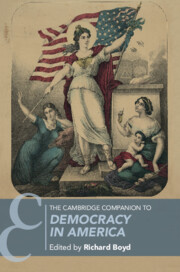Book contents
- The Cambridge Companion to Democracy in America
- Series page
- The Cambridge Companion to Democracy in America
- Copyright page
- Contents
- Contributors
- Acknowledgments
- Chronology
- Abbreviations of Tocqueville’s Major Works
- Introduction
- Part I Sources and Contexts
- 1 Tocqueville and the Philosophy of the Enlightenment
- 2 Tocqueville’s Dialogues
- 3 Fugitive Aristocracy: Tocqueville’s Search for Remnants of the Ancien Régime
- Part II Receptions and Applications
- Part III Genres and Themes
- Part IV Democracy’s Enduring Challenges
- References
- Index
- Series page
3 - Fugitive Aristocracy: Tocqueville’s Search for Remnants of the Ancien Régime
from Part I - Sources and Contexts
Published online by Cambridge University Press: 23 March 2022
- The Cambridge Companion to Democracy in America
- Series page
- The Cambridge Companion to Democracy in America
- Copyright page
- Contents
- Contributors
- Acknowledgments
- Chronology
- Abbreviations of Tocqueville’s Major Works
- Introduction
- Part I Sources and Contexts
- 1 Tocqueville and the Philosophy of the Enlightenment
- 2 Tocqueville’s Dialogues
- 3 Fugitive Aristocracy: Tocqueville’s Search for Remnants of the Ancien Régime
- Part II Receptions and Applications
- Part III Genres and Themes
- Part IV Democracy’s Enduring Challenges
- References
- Index
- Series page
Summary
In this chapter, Richard Avramenko suggests that Tocqueville’s voyage to America should be understood in light of a lifelong aristocratic concern for unearthing lost remnants of the Ancien Régime. By way of illustrating Tocqueville’s ambivalent relationship to aristocracy, Avramenko draws an etymological distinction between the concepts of “debris” and “remnants,” two words Tocqueville uses in systematic ways throughout his corpus to differentiate certain institutions of the Ancien Régime that are doomed from others that might be rehabilitated for a democratic age. Avramenko traces the etymology of these two words in the French tradition and then locates these usages in Tocqueville’s discussion of various aristocratic or quasi-aristocratic institutions in the United States such as the Native Americans, the American South, the military, the new industrial aristocracy, and the profession of the law. Avramenko finds one inspiration for Tocqueville and Gustave de Beaumont’s travels in their childhood fascination with a 1798 novella Voyage d’un Allemand au Lac Onéida by Sophie von La Roche. The book tells the story of an aristocratic couple’s exile to Lake Oneida, New York, one of the destinations Tocqueville and Beaumont visited during their travels as chronicled in Tocqueville’s “Journey to Lake Oneida.”
Keywords
- Type
- Chapter
- Information
- The Cambridge Companion to Democracy in America , pp. 100 - 130Publisher: Cambridge University PressPrint publication year: 2022
- 2
- Cited by

